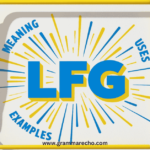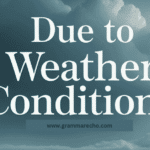In language, clarity is key, especially when navigating commonly confused phrases like “Of Course” and “Ofcourse.” While they may seem similar, understanding the correct usage of these terms can significantly enhance your communication skills. Many people casually mix them up, leading to misunderstandings in both spoken and written contexts.
In this article, we’ll explore the focus keyword differences between Of Course or Ofcourse, delving into their meanings, proper usage, and the impact of correct spelling on effective communication. By the end, you’ll feel confident in your understanding and application of this essential phrase in your everyday interactions.
Why Is There Confusion?
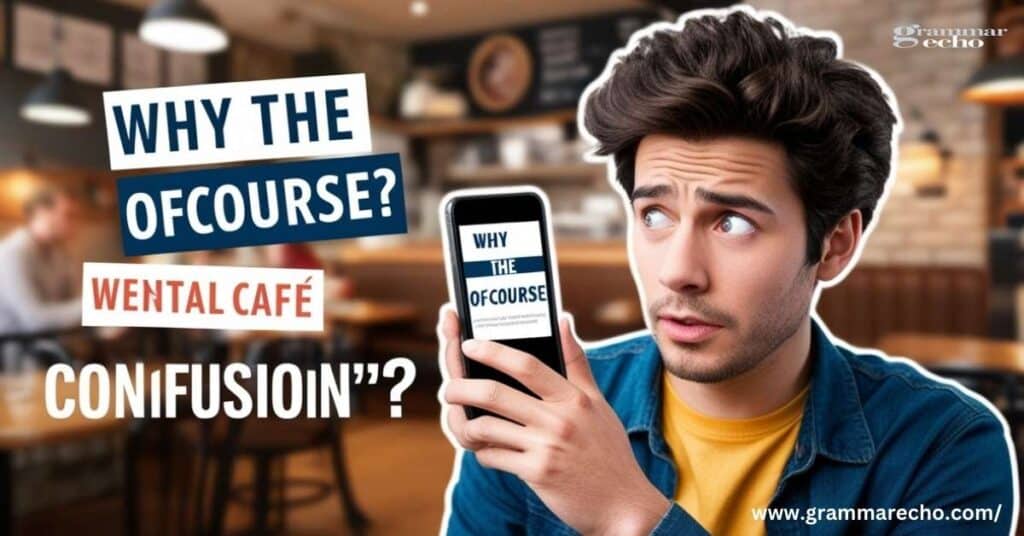
In today’s fast-paced world of informal vs formal language, many people use digital communication more than ever before. As a result, some words and phrases become muddled. The phrase “of course” is often confused with the incorrect spelling “of course.” This confusion arises mainly from the way we write in everyday speech and the influence of common misspellings that circulate in social media and texting.
For instance, someone might text a friend saying, “I’ll be there at 5, of course.” This informal setting can lead to the incorrect usage of “of course,” which is not recognized as a proper spelling in standard English. The challenge lies in ensuring that we communicate clearly and correctly, especially when it comes to phrases that seem simple at first glance.
What Do “Of Course” and “Ofcourse” Mean?
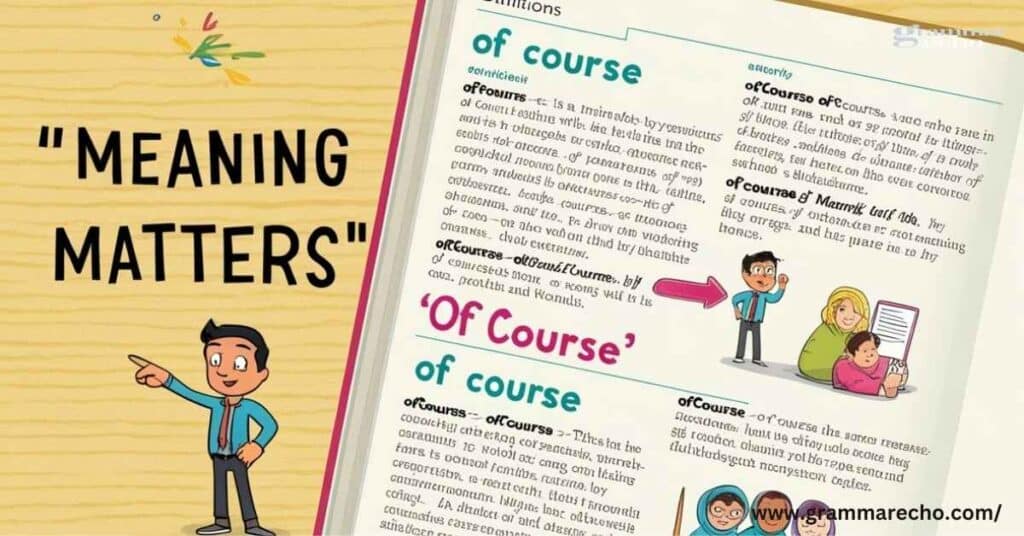
Of Course Meaning
“Of course” is a phrase used to express agreement, affirmation, or certainty. It conveys that something is obvious or expected. For example, if someone asks, “Can I borrow your pen?” you might respond, “Of course!” This indicates that you agree and see no reason to refuse.
Of course Definition
On the other hand, “of course” is simply a common misspelling. In terms of meaning, it holds no substance since it does not exist in standard English dictionaries. Recognizing this distinction is essential for clear communication in writing.
You will like: Long Term or Long-Terms: What’s the Right Choice in Writing?
Correct Usage of “OfCourse”

When to Use “Of Course”
Using “of course” correctly is crucial for effective written communication. Here are some contexts in which you might use it:
- Agreement:
- Example: “Would you like to join us for dinner?”
- Response: “Of course! I’d love to.”
- Polite Permission:
- Example: “Can I take a look at your notes?”
- Response: “Of course. Feel free to borrow them.”
- Certainty:
- Example: “Do you think it will rain tomorrow?”
- Response: “Of course! The forecast predicts showers.”
Of Course Usage in Sentences
Here are additional of course examples that illustrate the phrase in various contexts:
| Context | Example Sentence |
| Affirmation | “Will you help me with this project?” |
| “Of course! I’m here to assist.” | |
| Expectation | “She didn’t show up at the meeting?” |
| “Of course, she’s always late.” | |
| Emphasis | “Is it hard to learn a new language?” |
| “Of course, with practice, it gets easier.” |
Common Mistakes in Writing
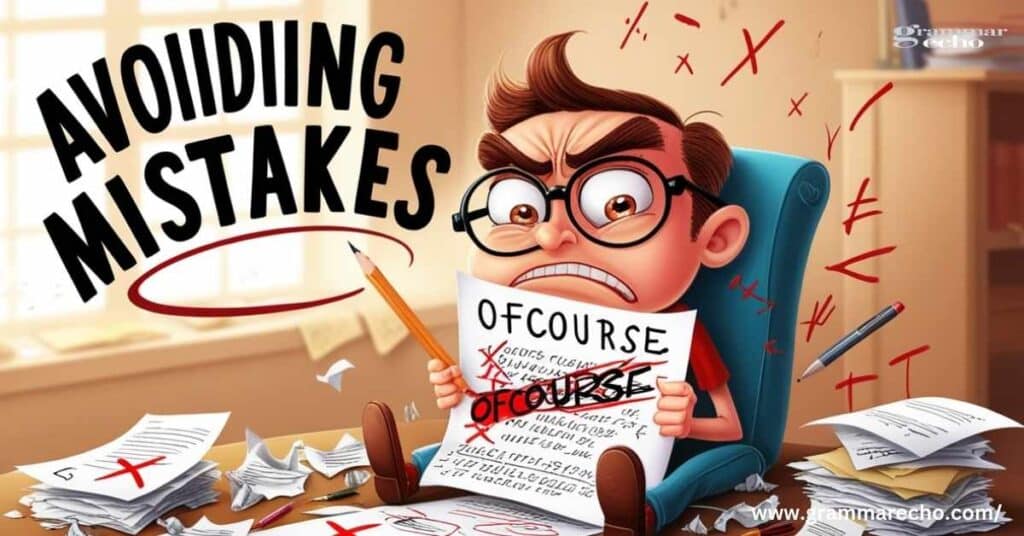
Many people make common mistakes in writing by using “ofcourse” instead of “of course.” This can lead to misunderstandings and diminish the professionalism of your writing.
Correct Spelling
Always remember that the correct spelling is two words: “of course.” Keeping this in mind will help you maintain clarity in your communication.
You will like: Arised or Arose: What’s the Correct Past Tense of Arise?
Synonyms for “Of Course”
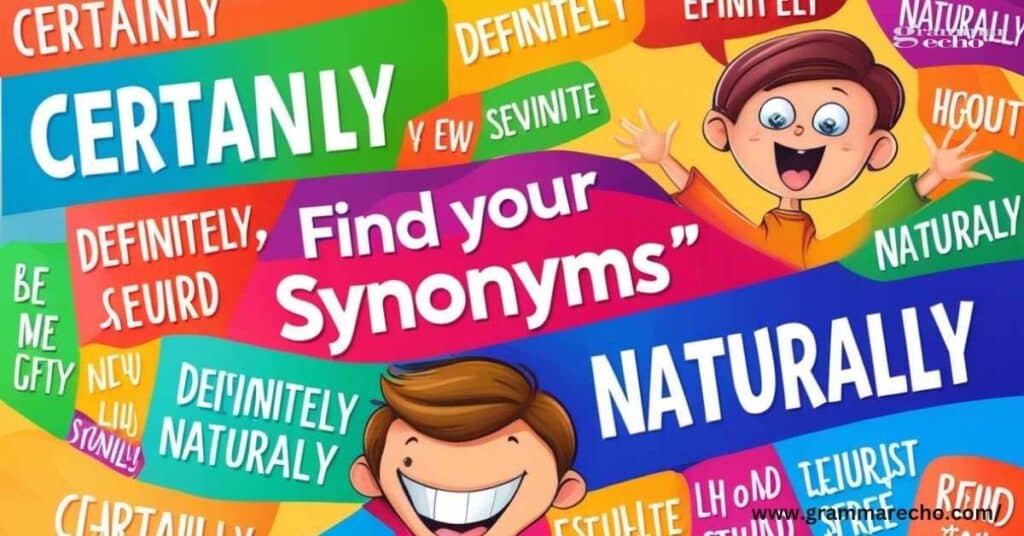
Understanding of course synonyms can enhance your vocabulary and help you express agreement or certainty in various ways. Here are a few alternatives:
- Certainly
- Definitely
- Naturally
- Of course, indeed
Using these synonyms appropriately can add variety to your writing and speaking.
Misuse of “Of course”
The misuse of “ofcourse” can often occur in informal settings, especially on social media or in text messages. For instance, someone might write, “I’ll be there in 10 minutes, ofcourse.” This is incorrect and should be written as, “I’ll be there in 10 minutes, of course.”
Example Scenarios
Let’s explore a few scenarios where people might confuse these terms:
- Texting a Friend:
- Incorrect: “Sure, I can help you with that, ofcourse.”
- Correct: “Sure, I can help you with that, of course.”
- Professional Email:
- Incorrect: “We will deliver the report on time, ofcourse.”
- Correct: “We will deliver the report on time, of course.”
- Casual Conversation:
- Incorrect: “If you need anything, just ask, ofcourse.”
- Correct: “If you need anything, just ask, of course.”
These examples highlight the importance of using the correct form to maintain professionalism and clarity.
Avoiding Errors in Writing
To ensure you avoid errors such as the misuse of “ofcourse,” consider these writing tips:
- Proofread Your Work: Always check your writing for common misspellings and grammatical errors. This simple step can enhance the quality of your work significantly.
- Use Grammar Tools: Consider using tools like Grammarly or Hemingway to catch mistakes you might overlook.
- Practice Makes Perfect: The more you write, the more familiar you will become with correct phrases and their spellings.
The Origins of “Of Course”

The phrase “of course” has its roots in the English language dating back to the 16th century. It combines “of,” a preposition indicating belonging or origin, with “course,” which originally referred to a path or direction. Over time, the phrase evolved to express agreement or acknowledgment of an obvious fact.
Understanding the of course origin helps to appreciate its usage today, especially in the context of clear communication.
Clarity in Writing
Using the correct form of phrases like “of course” contributes to clarity in writing. When you communicate clearly, your audience understands your message better, which is crucial in both personal and professional settings.
Impact on Professional Writing
In professional writing, the correct usage of phrases can reflect your attention to detail and command of the language. Using “ofcourse” correctly can make your writing appear more polished and credible.
Everyday Speech
In everyday speech, “ofcourse” serves as a conversational tool that signals agreement or acknowledgment without sounding overly formal. It makes dialogues feel natural and engaging.
Transitioning Between Informal and Formal Language
Transitioning from informal to formal language can be tricky. However, knowing when to use “of course” helps maintain a professional tone while still sounding approachable.
Final Words
In conclusion, understanding the correct usage of Of Course or Ofcourse is essential for clear communication. Always use “of course” as two separate words to convey agreement or certainty. Avoiding common mistakes enhances your writing and speaking skills.
FAQs
“Of course” expresses agreement or affirmation, indicating that something is obvious or expected.
No, “ofcourse” is a common misspelling. The correct form is always “of course.”
Proofread your writing and practice using “of course” in different contexts to build confidence.

Lily Suzi is an experienced blogger and the voice behind Grammar Echo. With a passion for language and a knack for storytelling, she explores the nuances of grammar and writing in a relatable way. Her insights not only educate but also inspire readers to appreciate the beauty of clear communication.



